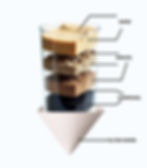Ever wondered how dirty water becomes clean? In this DIY Water Filter Science Project, kids will create a working water filter using sand, gravel, and activated charcoal to learn about filtration and water purification!
Want to explore more fun STEM projects? Check out our STEM Learning Program for Grades 2-12!

Table of Contents:
Introduction to DIY Water Filters
Water is essential for life, but not all water is safe to drink. This DIY water filter science project will help kids understand how filtration works to remove dirt, debris, and contaminants from water using simple materials!
Related Topic: Want to explore another environmental science project? Check out our Rainwater Harvesting Model and learn how to collect and store rainwater!
Did You Know?
More than 2 billion people worldwide don’t have access to clean drinking water.
Natural filters like sand & charcoal have been used for water purification for centuries!
How Does a Water Filter Work?
A water filter removes dirt, bacteria, and harmful particles from water. It works by allowing water to pass through different layers of materials, which trap contaminants.
Key Concepts Kids Will Learn:
Filtration – Separating solid particles from liquids.
Absorption – How activated charcoal removes impurities.
Layered Purification – Using different materials to clean water step by step.

Materials Required
Here’s what you need to make a DIY water filter:
Name | Quantity | Purpose |
Plastic Bottle | 1 | Acts as the filter container |
Sand | 1 cup | Removes fine particles from water |
Gravel | 1 cup | Traps larger dirt and debris |
Activated Charcoal | 1 cup | Absorbs chemicals and impurities |
Cotton or Coffee Filter | 1 piece | Prevents dirt from passing through |
Dirty Water (for testing) | 1 cup | Demonstrates filtration effectiveness |
Scissors & Knife | 1 set | Used to cut and shape the bottle |
Step-by-Step Guide: How to Make a DIY Water Filter
1. Cut the Bottle
Cut the plastic bottle in half to use the top part as a funnel.
Turn it upside down so the cap end is at the bottom.
2. Layer the Filter Materials
Place cotton or a coffee filter inside the bottle’s neck.
Add a layer of activated charcoal (this helps remove chemicals and odors).
Pour a layer of sand on top.
Finally, add a layer of gravel (this traps larger debris).
3. Pour in the Dirty Water
Slowly pour dirty water through the filter.
Watch as clearer water drips out the bottom!
4. Test & Observe
Compare the filtered water with the original dirty water.
Discuss how each layer helped remove different impurities.
The Science Behind Water Filtration
Each layer in the filter has a role in cleaning the water:
How Different Layers Work in Water Filtration
Filter Layer | Function | Real-Life Use |
Gravel | Catches large debris & dirt | Riverbeds filter water naturally |
Sand | Removes small particles | Used in water treatment plants |
Activated Charcoal | Absorbs chemicals & toxins | Found in home water purifiers |
Cotton/Filter Paper | Prevents final debris from passing through | Used in lab experiments |
Experiment Variations & Real-Life Applications
Try These Fun Variations:
Add more layers – Try extra charcoal or sand and see if the water gets even cleaner!
Use different materials – Test cloth, sponges, or pebbles and compare results.
Boil the filtered water – Learn why boiling makes water even safer to drink.
Real-Life Connection: This simple water filter project is similar to how large water treatment plants clean water for homes and cities!
Conclusion
The DIY Water Filter Science Project is a great way for kids to explore water filtration and purification techniques using simple materials! This project shows how water can be cleaned and why safe drinking water is important.
Want more hands-on experiments? Check out our Smart Irrigation System and learn how technology helps water plants automatically!
Ready to take your learning further? Join our Advanced STEM & Robotics Program for Grades 2-12 and build exciting projects!
FAQs
1. Can this DIY water filter make water drinkable?
Ans. It helps remove dirt, but it does not remove bacteria or viruses. Always boil or purify water before drinking!
2. Why is activated charcoal used in filters?
Ans. It absorbs harmful chemicals & odors, making water cleaner.
3. How long does the filter take to work?
Ans. Water should pass through in a few minutes, depending on the filter layers.
4. Can I reuse the filter materials?
Ans. Yes, but replace the charcoal & clean the sand/gravel regularly for better results.
